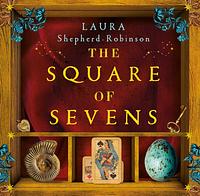You need to sign in or sign up before continuing.
Take a photo of a barcode or cover
I saw this book on a list of forthcoming historical fiction novels in 2023, and since the story takes place in the 18th century (not the most popular time?), I decided to give it a go. Overall, there were a number of things I liked and a few things that made the reading experience very frustrating. I adored the intrigue and the mysterious practice of cartomancy; those elements kept the plot interesting and vaguely supernatural. I also loved how the narrative became very Gothic around halfway through. However, Shepherd-Robinson also writes in a way that suggests she doesn't quite trust the reader to put things together on their own, so for that reason, this book gets 4 stars from me.
Writing: There are moments in this book that are genuinely well-written. I very much enjoyed the descriptions of Bath compared to descriptions of London, and I think Shepherd-Robinson did a good job using her prose to show us different aspects of each character.
However, there were a number of things that frustrated me. For one, Shepherd-Robinson relied overmuch on blunt questions whenever Red/Rachel (our protagonist) was piecing together elements from her past. For example, Red/Rachel found a paper with initials on it and would ask "were these my parents' initials?" She did this over and over again, to the point where it didn't feel like I was being trusted as a reader to pick up on the clues that the author was laying down.
For two, Shepherd-Robinson seems to be fairly blunt about character emotions, relying a bit too much on telling when it came to characters' feelings. Don't get me wrong - some of the telling works very well in places where the narrative isn't supposed to be very emotional. But in the moments when characters felt things very intensely, I felt like I was being held at arm's length, not invited to experience things along with Red/Rachel.
Lastly, there are a few moments where Red turns to the reader and draws attention the fact that she is writing the whole narrative down after the fact. To me, the technique felt somewhat clumsy; despite Red's memoir being important later on in the plot, storytelling and writing are not big themes, and the chapters that aren't from Red's perspective feel all the more confusing.
Plot: The plot of this book follows a mysterious girl named Red, who, at the age of 7, is adopted by a gentleman named Mr. Antrobus following the death of Red's father. Red and her father earn their living through fortune telling, and Red is particularly adept at cartomancy. They have in their possession a document called The Square of Sevens which explains Red's art, and both the document and Red herself are entrusted to Mr. Antrobus upon the father's death.
Ten years later, Red (going by Rachel) tries to uncover details about her past, yet Mr. Antrobus is adamant that she shouldn't go digging - for her own safety. However, when Mr. Antrobus decides to publish The Square of Sevens, he attracts the attention of a number of people who may or may not want Red dead, leaving Red to untangle not only her mysterious origins but avoid the people who would harm her.
Overall, the plot of this book was fine in the first half and more to my taste in the second. There was enough mystery and enough twists and turns to keep me interested up until Red departs for Leighfendell; I particularly enjoyed the moments of tension whenever Red was uncovering information about her past or moments when she was telling fortunes to powerful people. But things really picked up for me when the narrative turned Gothic in parts 3 and 4. I loved the estate with dark energy, the threatening male figures: the intricacies and secrets concerning the feuding family members was also good gossip material, and I kept reading on because I wanted to get to the bottom of the family drama.
I do think, however, that the pacing of this plot had a tendency to lag, especially in parts 1 and 2. This is a long book, but there isn't a strong sense of urgency or suspense that propels me as a reader forward until part three. This doesn't mean that I think the plot should have been bursting with action or pointless intrigue, but I do think Shepherd-Robinson had a tendency to linger and draw out the story, which did not always work for me.
Characters: There are quite a few characters in this book, so I'll only speak specifically about a handful of them and speak on generalities about the others.
Red, our protagonist and main POV character, is somewhat sympathetic, but at times, I found my support for her waxing and waning. I liked that she was so skilled at cartomancy and was somewhat conflicted about how much she wanted to influence a reading; having that moral dilemma made her actions more interesting, and her belief in the art itself also made for a complex relationship with fortune telling. However, for all we're told Red is good at reading people, she also seems to blunder her way through her investigation. She didn't strike me as particularly witty or insightful, and she's blunt and straightforward to the point where I was wondering why the investigation didn't blow up in her face more often. Perhaps some of her bluntness is because she's 16 and is writing a memoir (so there's some deception inherent in that), but that view is at odds with her early life on the road, so it's difficult for me to determine how I feel about Red as a character.
The more interesting character for me was Lazarus Darke. Darke is an investigator who works for Lady Seabrooke, the matriarch of one half of the feuding families. I found Darke's obsession with truth (even to the point where it cost him things like his job) and exploring the limits of his morality incredibly compelling, especially when put in the context of working for the Seabrooke family. I was also really interested in figuring out how Darke's relationship with Lady Seabrooke fit in with her history and youthful exploits, and his attachment to her was complicated enough where I felt like it could be both an admirable quality of loyalty and a personal fault.
The De Lacy family was interesting to read about, in part because they had so many secrets and in part because they were simultaneously kind and threatening. Especially in part 3, I got a Gothic vibe from them, and I loved their complicated history with the Seabrookes and with fortune telling.
The Seabrookes, meanwhile, were incredibly ambitious and determined, yet there were times when I felt some sympathy for them. Lady Seabrooke's single-mindedness about the family lawsuit was sometimes admirable (because she seemed to genuinely care about her son and his reputation) and sometimes pitiable (for the way she allows it to alienate her from almost everyone).
There weren't any characters that I disliked in terms of how they were written. Everyone seemed to be complex and well-rounded, even if they weren't the most likeable.
TL;DR: The Square of Sevens contains a complicated family feud and a history of dark secrets interwoven with cartomancy. While some aspects of Shepherd-Robinson's prose made it difficult for me to fully immerse myself in the story, the characters and the intrigue were compelling, and the narrative arc as a whole was perfect for someone who likes Gothic narratives and a bunch of 18th century family drama.
Writing: There are moments in this book that are genuinely well-written. I very much enjoyed the descriptions of Bath compared to descriptions of London, and I think Shepherd-Robinson did a good job using her prose to show us different aspects of each character.
However, there were a number of things that frustrated me. For one, Shepherd-Robinson relied overmuch on blunt questions whenever Red/Rachel (our protagonist) was piecing together elements from her past. For example, Red/Rachel found a paper with initials on it and would ask "were these my parents' initials?" She did this over and over again, to the point where it didn't feel like I was being trusted as a reader to pick up on the clues that the author was laying down.
For two, Shepherd-Robinson seems to be fairly blunt about character emotions, relying a bit too much on telling when it came to characters' feelings. Don't get me wrong - some of the telling works very well in places where the narrative isn't supposed to be very emotional. But in the moments when characters felt things very intensely, I felt like I was being held at arm's length, not invited to experience things along with Red/Rachel.
Lastly, there are a few moments where Red turns to the reader and draws attention the fact that she is writing the whole narrative down after the fact. To me, the technique felt somewhat clumsy; despite Red's memoir being important later on in the plot, storytelling and writing are not big themes, and the chapters that aren't from Red's perspective feel all the more confusing.
Plot: The plot of this book follows a mysterious girl named Red, who, at the age of 7, is adopted by a gentleman named Mr. Antrobus following the death of Red's father. Red and her father earn their living through fortune telling, and Red is particularly adept at cartomancy. They have in their possession a document called The Square of Sevens which explains Red's art, and both the document and Red herself are entrusted to Mr. Antrobus upon the father's death.
Ten years later, Red (going by Rachel) tries to uncover details about her past, yet Mr. Antrobus is adamant that she shouldn't go digging - for her own safety. However, when Mr. Antrobus decides to publish The Square of Sevens, he attracts the attention of a number of people who may or may not want Red dead, leaving Red to untangle not only her mysterious origins but avoid the people who would harm her.
Overall, the plot of this book was fine in the first half and more to my taste in the second. There was enough mystery and enough twists and turns to keep me interested up until Red departs for Leighfendell; I particularly enjoyed the moments of tension whenever Red was uncovering information about her past or moments when she was telling fortunes to powerful people. But things really picked up for me when the narrative turned Gothic in parts 3 and 4. I loved the estate with dark energy, the threatening male figures: the intricacies and secrets concerning the feuding family members was also good gossip material, and I kept reading on because I wanted to get to the bottom of the family drama.
I do think, however, that the pacing of this plot had a tendency to lag, especially in parts 1 and 2. This is a long book, but there isn't a strong sense of urgency or suspense that propels me as a reader forward until part three. This doesn't mean that I think the plot should have been bursting with action or pointless intrigue, but I do think Shepherd-Robinson had a tendency to linger and draw out the story, which did not always work for me.
Characters: There are quite a few characters in this book, so I'll only speak specifically about a handful of them and speak on generalities about the others.
Red, our protagonist and main POV character, is somewhat sympathetic, but at times, I found my support for her waxing and waning. I liked that she was so skilled at cartomancy and was somewhat conflicted about how much she wanted to influence a reading; having that moral dilemma made her actions more interesting, and her belief in the art itself also made for a complex relationship with fortune telling. However, for all we're told Red is good at reading people, she also seems to blunder her way through her investigation. She didn't strike me as particularly witty or insightful, and she's blunt and straightforward to the point where I was wondering why the investigation didn't blow up in her face more often. Perhaps some of her bluntness is because she's 16 and is writing a memoir (so there's some deception inherent in that), but that view is at odds with her early life on the road, so it's difficult for me to determine how I feel about Red as a character.
The more interesting character for me was Lazarus Darke. Darke is an investigator who works for Lady Seabrooke, the matriarch of one half of the feuding families. I found Darke's obsession with truth (even to the point where it cost him things like his job) and exploring the limits of his morality incredibly compelling, especially when put in the context of working for the Seabrooke family. I was also really interested in figuring out how Darke's relationship with Lady Seabrooke fit in with her history and youthful exploits, and his attachment to her was complicated enough where I felt like it could be both an admirable quality of loyalty and a personal fault.
The De Lacy family was interesting to read about, in part because they had so many secrets and in part because they were simultaneously kind and threatening. Especially in part 3, I got a Gothic vibe from them, and I loved their complicated history with the Seabrookes and with fortune telling.
The Seabrookes, meanwhile, were incredibly ambitious and determined, yet there were times when I felt some sympathy for them. Lady Seabrooke's single-mindedness about the family lawsuit was sometimes admirable (because she seemed to genuinely care about her son and his reputation) and sometimes pitiable (for the way she allows it to alienate her from almost everyone).
There weren't any characters that I disliked in terms of how they were written. Everyone seemed to be complex and well-rounded, even if they weren't the most likeable.
TL;DR: The Square of Sevens contains a complicated family feud and a history of dark secrets interwoven with cartomancy. While some aspects of Shepherd-Robinson's prose made it difficult for me to fully immerse myself in the story, the characters and the intrigue were compelling, and the narrative arc as a whole was perfect for someone who likes Gothic narratives and a bunch of 18th century family drama.
mysterious
slow-paced
Plot or Character Driven:
A mix
Strong character development:
Yes
Loveable characters:
Complicated
Diverse cast of characters:
No
Flaws of characters a main focus:
Yes
One of the most intriguing, ingenious, and historically enthralling novels I have read. I would expect no less from the author of Blood and Sugar. It is a shame this book was not listed in the Good Reads Choice voting for 2023. Terrible oversight.
adventurous
challenging
dark
mysterious
tense
I wanted something immersive and compelling, and this was that for the most part, but lacking in some substance. I knew of course there would be a twist from the start, and when it came out, I felt somehow cheated of the enjoyment I had in the foundational narrative. I don't think that's how a twist should work. The elaborate fortune-telling structure was more significant for the author than the reader, I think.
I think this has confirmed that historial fiction isn’t for me, even when fortune telling is involved. Gutted!
adventurous
fast-paced
Plot or Character Driven:
A mix
Strong character development:
Yes
Loveable characters:
Yes
Diverse cast of characters:
No
Flaws of characters a main focus:
Yes
medium-paced
dark
emotional
hopeful
mysterious
tense
medium-paced
Slow to begin with but once the story gets going I was gripped and could hardly put it down
So many twists and turns! Pay close attention and see if you can figure it out....
adventurous
emotional
lighthearted
mysterious
tense
medium-paced
Plot or Character Driven:
A mix
Strong character development:
Complicated
Loveable characters:
Yes
Diverse cast of characters:
Yes
Flaws of characters a main focus:
No




